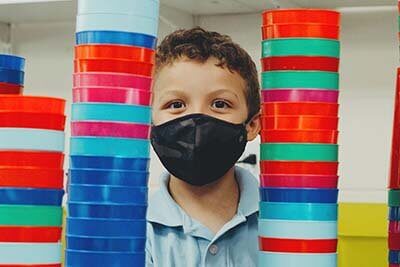January 27, 2022
 To say the least, parenting young children has presented many new challenges throughout the last two years. The COVID-19 pandemic has resulted in fewer opportunities for children to interact with their peers and develop independence. As students ages three to five prepare to attend PreK or kindergarten at MPA, many parents have questions and concerns about their child’s social and emotional readiness during this challenging time.
To say the least, parenting young children has presented many new challenges throughout the last two years. The COVID-19 pandemic has resulted in fewer opportunities for children to interact with their peers and develop independence. As students ages three to five prepare to attend PreK or kindergarten at MPA, many parents have questions and concerns about their child’s social and emotional readiness during this challenging time.
We are here to say, fear not! Young children are incredibly resilient, and they will rapidly make up for lost time. We have assembled some suggestions to help you ease into preparing your child for school this fall.
Start With Play
Young children learn best through play and thrive on interactions that help them grow. Playing make-believe is an excellent way for young children to learn and practice new skills. Pretending together provides an example of behavior for a child to emulate. Here are some fun ideas for learning opportunities disguised as pretend play:
- Play “story time” and take turns telling a story while the other listens.
- Go on a picnic, even if it’s indoors. Let your child use a lunch box
and practice eating and taking care of their leftovers and clean up
independently. - Pretend to be a new friend. Teach your child how to introduce
themselves, ask for the other person’s name, and invite the friend to play. - Have quiet time. This is a part of the PreK day at MPA. Even if your child
no longer naps, practice having some quiet time in the afternoon. Books, quiet music, and dim lighting can help them relax.
Establish Routines and Independence
Even if your child stays at home with a parent or caregiver during the day, now is a great time to create routines that build independence and teach the skills they will need at school. Tasks such as dressing themselves, putting on and removing outdoor gear, and caring for their own belongings build confidence in young children while teaching responsibility and self-reliance. Performing these tasks in a routine way helps them become habitual. Try using phrases such as these:
- “When you come inside, hang your coat up on the hook.”
- “After you’re finished eating, bring your dishes to the kitchen.”
- “When you’re done with the game, put all the pieces back in the box.”
- “Put your clothes in your hamper, then put on your pajamas.”
Look For Safe Opportunities For Social Interaction
If possible, having a playdate with a healthy friend is a wonderful chance for peer-to-peer social interaction. Though it may be a challenge to find safe structured activities with a group right now, the warmer weather of spring and summer will present more opportunities. Explore your community for age-appropriate activities including:
- early childhood or community education classes in your school district;
- story time at the local library;
- family programs at nature centers;
- activities or athletics through the YMCA or community center;
- music classes;
- playground playdates at MPA (MPA’s office of admission would be happy to connect you to both returning
and new families).
Take It Slow
It’s best to start small and go slowly. Some of these things may feel hard for some children while others take to them naturally. Each child has individual strengths and skills worth celebrating and encouraging.
Remember that children are not born knowing how to go to school. Skills such as walking in a line, taking turns, and quietly listening to a teacher are new for every child at some point. They also require a great deal of self- regulation, which is still developing in children at this age. The best thing parents can do is to help build their child’s confidence and provide a positive outlook about school.
Continue To Practice Other Skills
In addition to building social skills, here are some other activities you can do to help your child prepare for school this fall:
- Work on fine-motor strength by coloring and drawing, playing with playdough, and cutting with safety scissors.
- Count objects in your everyday life. Count the peas on their plate or the number of blocks in a tower. Counting objects helps establish one-to-one correspondence and builds a foundation for mathematical skills.
- Read together daily. Talk about the pictures and how they show what’s happening in the book. Ask your child questions about the story to help develop their comprehension skills.
- Feed your child’s natural curiosity by exploring the world around them together and talking about the things you encounter.
Find The Joy!
Parenting young children, especially right now, is not easy. You are likely feeling pulled in opposite directions by wanting to thoroughly prepare your child for PreK or kindergarten, but also being cautious and protecting their health. Remind yourself that though things have looked different these last two years, there has still been a lot of learning and growth taking place. Finding joy, even in difficult times, shows your child how to be positive when faced with adversity. Take time to play, be silly, and make memories. Your child is an amazing, wonderful young person with enormous potential. You won’t have to look too far to find the joy!